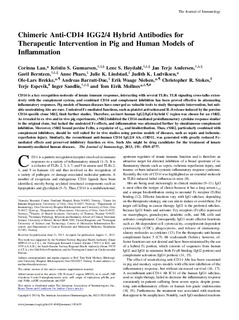| dc.contributor.author | Lau, Corinna | |
| dc.contributor.author | Gunnarsen, Kristin Støen | |
| dc.contributor.author | Høydahl, Lene Støkken | |
| dc.contributor.author | Andersen, Jan Terje | |
| dc.contributor.author | Berntzen, Gøril | |
| dc.contributor.author | Pharo, Anne Margrethe | |
| dc.contributor.author | Lindstad, Julie Katrine | |
| dc.contributor.author | Ludviksen, Judith K | |
| dc.contributor.author | Brekke, Ole Lars | |
| dc.contributor.author | Barratt-Due, Andreas | |
| dc.contributor.author | Nielsen, Erik Waage | |
| dc.contributor.author | Stokes, Christopher R. | |
| dc.contributor.author | Espevik, Terje | |
| dc.contributor.author | Sandlie, Inger | |
| dc.contributor.author | Mollnes, Tom Eirik | |
| dc.date.accessioned | 2017-10-24T13:18:32Z | |
| dc.date.available | 2017-10-24T13:18:32Z | |
| dc.date.created | 2013-10-18T13:02:35Z | |
| dc.date.issued | 2013 | |
| dc.identifier.citation | Journal of Immunology. 2013, 191 (9), 4769-4777. | nb_NO |
| dc.identifier.issn | 0022-1767 | |
| dc.identifier.uri | http://hdl.handle.net/11250/2461881 | |
| dc.description.abstract | CD14 is a key recognition molecule of innate immune responses, interacting with several TLRs. TLR signaling cross-talks extensively with the complement system, and combined CD14 and complement inhibition has been proved effective in attenuating inflammatory responses. Pig models of human diseases have emerged as valuable tools to study therapeutic intervention, but suitable neutralizing Abs are rare. Undesired Fc-mediated functions, such as platelet activation and IL-8 release induced by the porcine CD14-specific clone Mil2, limit further studies. Therefore, an inert human IgG2/IgG4 hybrid C region was chosen for an rMil2. As revealed in ex vivo and in vivo pig experiments, rMil2 inhibited the CD14-mediated proinflammatory cytokine response similar to the original clone, but lacked the undesired Fc-effects, and inflammation was attenuated further by simultaneous complement inhibition. Moreover, rMil2 bound porcine FcRn, a regulator of t1/2 and biodistribution. Thus, rMil2, particularly combined with complement inhibitors, should be well suited for in vivo studies using porcine models of diseases, such as sepsis and ischemia-reperfusion injury. Similarly, the recombinant anti-human CD14 IgG2/4 Ab, r18D11, was generated with greatly reduced Fc-mediated effects and preserved inhibitory function ex vivo. Such Abs might be drug candidates for the treatment of innate immunity-mediated human diseases. | nb_NO |
| dc.language.iso | eng | nb_NO |
| dc.relation.uri | http://www.jimmunol.org/content/191/9/4769.full | |
| dc.title | Chimeric Anti-CD14 IGG2/4 Hybrid Antibodies for Therapeutic Intervention in Pig and Human Models of Inflammation | nb_NO |
| dc.type | Journal article | nb_NO |
| dc.type | Peer reviewed | nb_NO |
| dc.description.version | publishedVersion | nb_NO |
| dc.source.pagenumber | 4769-4777 | nb_NO |
| dc.source.volume | 191 | nb_NO |
| dc.source.journal | Journal of Immunology | nb_NO |
| dc.source.issue | 9 | nb_NO |
| dc.identifier.doi | 10.4049/jimmunol.1301653 | |
| dc.identifier.cristin | 1058736 | |
| dc.relation.project | Norges forskningsråd: 223255;179573 | nb_NO |
| dc.description.localcode | Copyright © 2013 by The American Association of Immunologists, Inc. This article is distributed under The American Association of Immunologists, Inc.,Reuse Terms and Conditions for Author Choice articles. | nb_NO |
| cristin.unitcode | 194,65,15,0 | |
| cristin.unitcode | 194,65,15,30 | |
| cristin.unitname | Institutt for kreftforskning og molekylær medisin | |
| cristin.unitname | Centre of Molecular Inflammation Research (SFF-CEMIR) | |
| cristin.ispublished | true | |
| cristin.fulltext | original | |
| cristin.qualitycode | 2 | |
